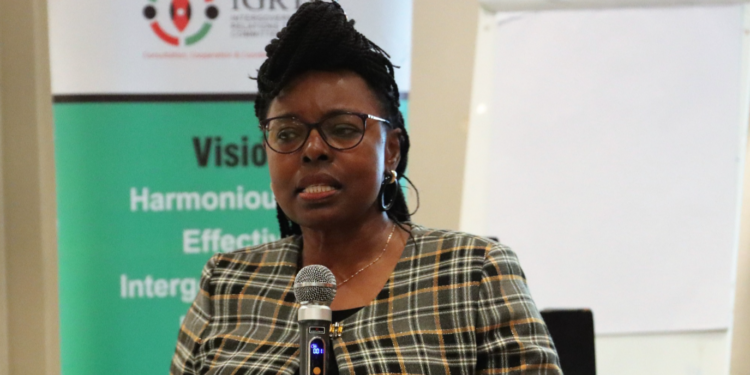Kenya’s mounting public debt repayment obligations are severely limiting funding available for critical development projects, a government report revealed.
Over one-third of Kenya’s 2022/23 national budget went to servicing debt totaling KES 10.25 trillion, according to the National Government Budget Implementation Review Report.
The report by Controller of Budget Margaret Nyakang’o showed KES 1.15 trillion, representing 36.5% of total spending, was used for debt repayments rather than building infrastructure and providing social services.
“The rise in public debt service cost occasioned by the increase in the Country’s public debt stock is one of the biggest challenges that hampered budget implementation in FY 2022/23,” Nyakang’o stated.
Total public debt surged 18.8% over the year to KES 10.25 trillion, split between KES 4.83 trillion in domestic debt and KES 5.42 trillion in external debt.
The approved budget allocated KES 1.39 trillion for debt servicing, comprising 87.8% of consolidated fund service spending. But liquidity problems meant only KES 1.15 trillion was spent.
Read more: Civil servants ordered to clear leave backlog by June 2024
This crowded out development expenditure, which plunged 14.4% to just KES 473.55 billion from the prior fiscal year. The paltry KES 473.55 billion for development projects was only 81% of the revised target.
The largest share of development expenditure went towards capital transfers to semi-autonomous government agencies (SAGAs), totalling KES 345.09 billion or 72.9% of the total. The State Department for Infrastructure/Roads accounted for the biggest capital transfer at KES 71.08 billion.
Other major development expenditures were KES 25.17 billion for construction and civil works and KES 4.93 billion for pre-feasibility and appraisal studies.
Significant amounts classified as “other expenses” by MDAs included KES 17.03 billion by the State Department for Crop Development and Agricultural Research, KES 15.78 billion by the State Department for Infrastructure/Roads, and KES 14.17 billion by the National Treasury.
At the same time, recurrent spending on items like government salaries and allowances consumed a massive 87.6% of the revised budget at KES 2.71 trillion.
Within recurrent expenditure, travel spending hit KES 20.37 billion. Parliament chalked up the highest bills, spending KES 4.81 billion on domestic trips and KES 1.59 billion on foreign junkets.
The largest other operating expenses were incurred by the National Treasury (KES 11.16 billion), State Department for Interior and Citizen Services (KES 10.19 billion), Executive Office of the President (KES 8.54 billion), State Department for Early Learning & Basic Education (KES 5.13 billion), and State Department for Internal Security and National Administration (KES 3.47 billion).
Read more: How to check if your passport is ready for collection
Other major recurrent expenditures were KES 19.53 billion on insurance, mostly for government vehicles; KES 8.64 billion on hospitality and catering, with the president’s office the top spender at KES 2.34 billion; and KES 3.33 billion on salaries and allowances.
To tackle excessive borrowing, Controller Nyakang’o prescribed fiscal consolidation focused on reducing budget deficits. She also advised auditing existing loans to ensure transparency in debt accumulation.
“There is need for fiscal consolidation with a target to reduce deficit budget financing and focus on tax administration measures to boost revenue collection,” Nyakang’o recommended.
Despite the overall budget shortfall, county governments received 100% of their allocations totaling KES 399.6 billion. However, their spending reached just 83.6% due to procurement and absorption hurdles.
The report underscored the heavy opportunity cost of Kenya’s runaway public debt in terms of foregone development projects. As debt repayments eat up more resources, critical infrastructure and social service investments will continue suffering.
Tighter fiscal discipline, transparency in borrowing, and diversified financing sources in multiple currencies are urgently needed to ease pressure on the budget.
Here are some important figures from the report:
| Category | Amount |
|---|---|
| Total National Budget 2022/23 | 2.03 trillion |
| Debt Repayments | 1.15 trillion |
| % of Budget Spent on Debt | 36.5% |
| Development Expenditure | 473.55 billion |
| Recurrent Expenditure | 2.71 trillion |
| % of Budget Spent on Recurrent | 87.6% |
| Travel Spending | 20.37 billion |
| Parliament Travel Spending | 6.4 billion |
| National Debt Total | 10.25 trillion |
| Domestic Debt | 4.83 trillion |
| External Debt | 5.42 trillion |
| County Government Allocation | 399.6 billion |
| % of County Allocation Spent | 83.6% |
| Capital Transfers to SAGAs | 345.09 billion |
| Largest Capital Transfer (Infrastructure/Roads) | 71.08 billion |
| Construction and Civil Works Spending | 25.17 billion |
| Pre-Feasibility Studies Spending | 4.93 billion |
| Other Expenses by Crop Development | 17.03 billion |
| Other Expenses by Infrastructure/Roads | 15.78 billion |
| Other Expenses by National Treasury | 14.17 billion |
| Insurance Spending | 19.53 billion |
| Hospitality/Catering Spending | 8.64 billion |
| Executive Office Hospitality/Catering | 2.34 billion |
| Salaries and Allowances | 3.33 billion |

















